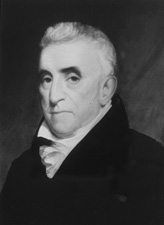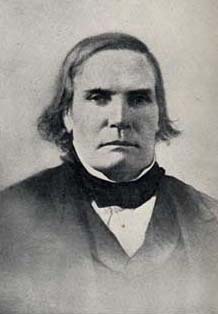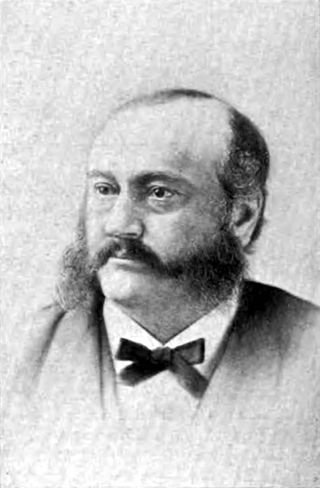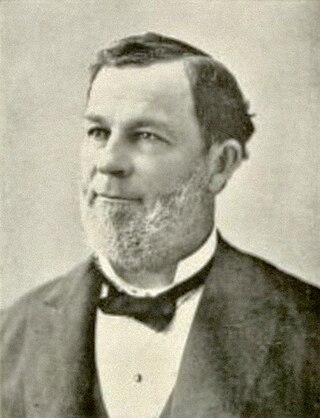
Timothy Dwight was an American academic and educator, a Congregationalist minister, theologian, and author. He was the eighth president of Yale College (1795–1817).

David Daggett was a U.S. senator, mayor of New Haven, Connecticut, Judge of the Connecticut Supreme Court of Errors, and a founder of the Yale Law School. He helped block plans for the first college for African Americans in the United States and presided over the conviction of a woman running a boarding school for African Americans in violation of Connecticut's recently passed Black Law. He judged African Americans not to be citizens and supported their colonization to Africa.

Samuel Fessenden was an American attorney, abolitionist, and politician. He served in both houses of the Massachusetts state legislature before Maine became a separate state. He was elected as major general in the state militia. He was considered a leader among his professional peers.

Marshall Jewell was a manufacturer, pioneer telegrapher, telephone entrepreneur, world traveler, and political figure who served as 44th and 46th Governor of Connecticut, the US Minister to Russia, the 25th United States Postmaster General, and Republican Party National Chairman. Jewell, distinguished for his fine "china" skin, grey eyes, and white eyebrows, was popularly known as the "Porcelain Man". As Postmaster General, Jewell made reforms and was intent on cleaning up the Postal Service from internal corruption and profiteering. Postmaster Jewell helped Secretary of the Treasury Benjamin H. Bristow shut down and prosecute the Whiskey Ring. President Grant, however, became suspicious of Jewell's loyalty after Jewell fired a Boston postmaster over non payment of a surety bond and asked for his resignation.

Alonzo Barton Cornell was a New York politician and businessman who was the 27th governor of New York from 1880 to 1882.

William Cooper was an American merchant, land speculator and developer, the founder of Cooperstown, New York. A politician, he was appointed as a county judge and later served two terms in the United States Congress, representing Otsego County and central New York. He was the father of James Fenimore Cooper, who became a noted writer of historical novels related to the New York frontier.

Elizur Goodrich was an eighteenth-century American lawyer and politician from Connecticut. He served as a United States representative from Connecticut and Collector of Customs. He was also a slave owner.

Russell Sturgis was an American architect and art critic of the 19th and early 20th centuries. He was one of the founders of the Metropolitan Museum of Art in 1870.

Henry Jarvis Raymond was an American journalist, newspaper publisher, and politician who co-founded both the Republican Party and The New York Times.

Jesse Burgess Thomas was an American lawyer, judge and politician who served as a delegate from the Indiana Territory to the tenth Congress and later served as president of the Constitutional Convention which led to Illinois being admitted to the Union. He became one of Illinois' first two Senators, and is best known as the author of the Missouri Compromise of 1820. After his retirement from the U.S. Senate in 1829 he lived the rest of his life in Ohio.

William Dorsheimer was an American lawyer, journalist, newspaper publisher, and politician.
Connecticut is known as "The Constitution State". The origin of this title is uncertain, but the nickname is assumed to be a reference to the Fundamental Orders of 1638–39 which represent the framework for the first formal government written by a representative body in Connecticut. Connecticut's government has operated under the direction of five separate documents in its history. The Connecticut Colony at Hartford was governed by the Fundamental Orders, and the Quinnipiac Colony at New Haven had its own Constitution in The Fundamental Agreement of the New Haven Colony which was signed on 4 June 1639.

William Hall Yale was a Minnesota lawyer and Republican politician who served as Senator and sixth Lieutenant Governor of Minnesota. He was made regent of the University of Minnesota in 1894 by Governor Nelson, and was a member of the Episcopal Church.
The following table indicates the party of elected officials in the U.S. state of Connecticut:
Andrew Thompson Judson was a United States representative from Connecticut and a United States district judge of the United States District Court for the District of Connecticut. He also served in the Connecticut House of Representatives. He was a member of the Toleration Party and an officer of the American Colonization Society. A leading white supremacist, he led opposition to Prudence Crandall's school for African Americans in Connecticut and advocated for African Americans to be subjugated or sent to Africa. He also opposed the establishment of a college for African Americans in New Haven. As a judge in the United States v. The Amistad he ruled the enslaved captives aboard La Amistad be released and returned to Africa.

Frederic Beecher Perkins was an American editor, writer, and librarian. He was a member of the Beecher family, a prominent 19th-century American religious family.

Harry Croswell was a crusading political journalist, a publisher, author, and an Episcopal Church clergyman. Though largely self-educated, he received an honorary degree of A. M. from Yale College in 1817, an honorary Doctorate of Divinity from Trinity College, Hartford, Connecticut in 1831 – an institution he co-founded – established the first public lectures in New Haven, and founded an evening school for the education of adult African-Americans in the city. He was a key figure in first amendment battles over freedom of the press and religious freedom. After abandoning politics for religion, he became the much respected Rector of Trinity Church on the Green in New Haven, Connecticut, for forty-three years, growing his church and establishing seven new churches within the original limits of his parish. Though he published fourteen books, and wrote newspaper articles as an editor and journalist weekly for eleven years, he is best known as an author for being the first person to define the word cocktail in print.

Benjamin Douglas Silliman was an American lawyer and politician from New York.
James Robbins Lawrence was an American lawyer, politician, and judge from New York.

![]() This article incorporates text from a publication now in the public domain : Wilson, J. G.; Fiske, J., eds. (1891). "BABCOCK, James F.". Appletons' Cyclopædia of American Biography . New York: D. Appleton.
This article incorporates text from a publication now in the public domain : Wilson, J. G.; Fiske, J., eds. (1891). "BABCOCK, James F.". Appletons' Cyclopædia of American Biography . New York: D. Appleton.













